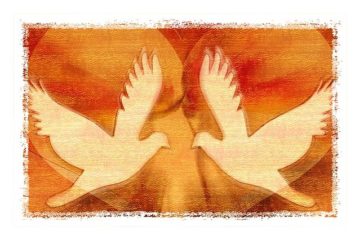 The call today is really to reach out to the desire of young people, but a desire that must ultimately be directed towards “serving”. The time of young people today is still, I think and we are convinced of this, a time of waiting; like you, it was a time of waiting. But for you, it was a time of waiting through relatively clear commitments in society. Today, it’s a time of waiting in multiple commitments that are still being sought, a time of hope despite everything. It’s true that, today, young people are marked by answers that don’t arrive immediately, in a centring precisely, because we’re no longer as obviously in collective utopias, and therefore in an ambient individualism too.
The call today is really to reach out to the desire of young people, but a desire that must ultimately be directed towards “serving”. The time of young people today is still, I think and we are convinced of this, a time of waiting; like you, it was a time of waiting. But for you, it was a time of waiting through relatively clear commitments in society. Today, it’s a time of waiting in multiple commitments that are still being sought, a time of hope despite everything. It’s true that, today, young people are marked by answers that don’t arrive immediately, in a centring precisely, because we’re no longer as obviously in collective utopias, and therefore in an ambient individualism too.
Research
There are no clear perspectives, so we are more easily centred on ourselves, on our tribe, on our groups of friends, on the groups with which we meet regularly, on those with whom we are in contact via the computer, via the mobile. We look for something without finding it, so we zap from one centre of interest to another. But there are passions in there, admittedly ephemeral passions, but passions. You connect, you try to find meaning and you want to achieve success; you want to finally find something, find a place where you are yourself. And, in some ways, I think that Ignatius’ itinerary was indeed to find the itinerary for himself, to be himself, to want to be recognised, to be recognised in the exercise of arms, to be recognised in his will to seduce, to be loved; he even tried to seduce God through his ascetic exploits. I think there is something of this young Ignatius today, but the experience that is lived in the spiritual path of Manrese and in your path too, is to pass from this desire to be recognised, to find one’s place, to be loved, this original desire, this somewhat narcissistic desire in the end, to the call to a service: that is to say, to love oneself in return, that there be an exchange as in the “Contemplation to reach love”, an exchange of freedom between man and his Creator. By recognising all that we live through our other searches, through all the goods that are given to us, with all the discoveries that we make, with the encounters that we have, through all the gifts that we receive, to offer this desire in order to make it live in service, a service that is put into actions, not only into words, a service that is lived in communication with the One who gives.
Joy
The call is to rejoice in what is given, to give it back: “Rejoice, young man”. “Rejoice, young man, in the days of your youth; do not forget your Creator in the days of your youth To make them discover that this service is a source of joy, a joy of serving created things. To bring young people, finally, to that zero point which is ” The Principle and Foundation ” which defines the end of every man: ” Man is created to praise, respect and serve God “. And God has not failed to give him many things in his life, help, all the things created to help him do this. What young people experience, what people experience today, can be very good, it is given to man to help him, to arrive at this end of praise together, of service together. We must use this freedom, use the things that are given. In “The Principle and Foundation”, it is not simply a matter of freeing oneself from things, but of using them. We must not make idols of them, but use them: material things, but also spiritual things, relationships with others, friendship, love, making use of mediation.
desire
So the first place of the call today is to accompany this passage from desire to service: to rely on the dynamism of youth, on their generosity, on their expectation in the present, on their hope, sometimes uncalculated, sometimes not very serious, but which is there nevertheless. There is a talent, a talent that they cannot bury: risking their freedom in this by finding the right relationships with others, by working on the places where they are, on commitments that are different from ours, perhaps. There is a common good at stake, which is to be served in their professional commitment, in their civic commitment, and also, perhaps, in what is rest, that is to say, in distance, in celebration, rendering something that is of the order of a common praise to the common Creator, by living fraternally a free time of contemplation and celebration, I believe that the call today, for young people, is also very much in this area: times of contemplation and celebration, when we allow festive sharing to take place. When young people aged 18 to 30 lead the Mass in my parish, it lasts longer than the usual Masses, because there is a need to celebrate this. And so, in this place of a path where you don’t bury your talent but make it happen as a service, you really become what you are. So, there is a need for accompaniment to discover this, to help one go to the end of what one carries, in one’s relationships, in one’s commitments, whatever they may be, in one’s work, in one’s relationship with the neighbourhood, in one’s celebrations, to go to the end of what one carries, to help one re-read it.
The call today: we must be more than ever capable of meeting young people in these places of desire to be themselves, to arrive at a service by accompanying this journey.
Reference points
The second place that seems important to me for the call today is to be able to offer them markers to find themselves, not just to find themselves, that was my first point, but to help them find themselves. Because they are in a world, we are in a world where we are confronted with difficulties, trials, failures. We are confronted with external rules, but precisely that is a journey through moments when we had the impression that we were not found, when we did not make good use of the means we were given, when we failed, when we had difficulties in relation to the rules we set for ourselves, including in the EVS. On this journey, on this path, we need to be reconciled with God because we have been through trials, because we have been through sins, we have been through infidelities, and the God we meet is the Creator God, but also the Redeemer God who makes us become new, who makes us find ourselves new. I think that for today’s young people, there is a need to help them to live this crossing, also in community: celebrations, the time we give to them, the place we give to them, the way we find ourselves together, forgiving together; having gone through this, living moments of fraternal life where we assume our weaknesses, our capacity for illusion, but also our availability to respond to the call, everything that is played out in the rereadings that you do, which consider the past, the places where we are, but with an open future. You have to see that society is also a theological place.
So, in the first instance, the call is first of all an accompaniment to move from desire to service, that is to say, to find the foundation of what they are created for, the foundation of what they are, not an external shell, but something more personal.
Secondly, it is in the places of crossing in their lives and many today, it seems to me, in the places of commitments different from ours but of presence in the fractures, of discovery that there is a crossing that is played out.
Finally, the third importance for today’s call is the passage and, for some, the more complicated passage to commitment. Because there is a real vocation at stake here: to move on to an “I want”; to move on from what we are looking for, like the rich young man: “All this I want to do” to “Something is missing”: “Something is missing in you “. The call to find that “something” is to follow someone, to follow Christ who is the way to life, not to be deaf to the call of the King. To allow oneself to hear the one who calls in there. Christ is calling, and to say to oneself: ” Here! I have a vocation “, whatever it may be, that of the disciples, that of Zacchaeus, that of following Jesus or that of being at home like Zacchaeus. As Madeleine Delbrêl said, there are people in the houses and people in the streets. But how do we accompany this listening, a search for a vocation, whatever it may be? To say “I want to” is complicated today. Is this voluntarism? But willpower is also in some ways a faculty of affectivity, not simply of effectiveness. Simply, at some point, we must be able to say “I want” as in the offering in the King’s call: “I want and I desire”. Desire without will may be vain, but desire is the wind that pushes the sails, that which makes us move forward and, as a result, an “I want” is to give oneself a rudder that guides, otherwise one risks gybing. Accompanying these vocations, discovering that each one has a vocation, the passage to an “I want”, is perhaps, it seems to me, the most complex, the slowest, the most difficult element today.
Extract from a conference given by Bertrand Cassaigne, SJ 2 and 3 December 2017
Further information
In our appeals to young people, is there any rejoicing going on? In what ways do I move from “desire to service”? How am I attentive to the emergence of vocations, whatever they may be?



